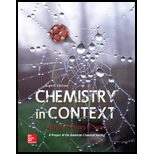
Chemistry in Context
8th Edition
ISBN: 9780073522975
Author: American Chemical Society
Publisher: McGraw-Hill Education
expand_more
expand_more
format_list_bulleted
Concept explainers
Textbook Question
Chapter 12, Problem 5Q
Consider the structural formulas in Figure 13.1.
- a. What
functional group (s) are found in the adenine molecule? - b. What functional group(s) are found in the deoxyribose molecule?
- c. From what you learned in Section 11.4, why is deoxyribose a sugar and adenine is not?
Expert Solution & Answer
Want to see the full answer?
Check out a sample textbook solution
Students have asked these similar questions
In the phase diagram of quartz (SiO2), indicate what happens as the pressure increases.
Briefly describe scanning electron microscopy (SEM) and transmission electron microscopy (TEM).
Show work. Don't give Ai generated solution
Chapter 12 Solutions
Chemistry in Context
Ch. 12.1 - Prob. 12.2YTCh. 12.1 - Prob. 12.3YTCh. 12.2 - Prob. 12.5CTCh. 12.2 - Prob. 12.6YTCh. 12.3 - Prob. 12.8CTCh. 12.3 - Prob. 12.9CTCh. 12.4 - Prob. 12.12YTCh. 12.5 - Scientific Practices Function Follows Form In...Ch. 12.6 - Prob. 12.15YTCh. 12 - The theme of this chapter is that DNA guides the...
Ch. 12 - Prob. 2QCh. 12 - Prob. 4QCh. 12 - Consider the structural formulas in Figure 13.1....Ch. 12 - Prob. 6QCh. 12 - Prob. 7QCh. 12 - Prob. 8QCh. 12 - Prob. 9QCh. 12 - Prob. 10QCh. 12 - Prob. 11QCh. 12 - Prob. 12QCh. 12 - Prob. 13QCh. 12 - Prob. 14QCh. 12 - Prob. 15QCh. 12 - Prob. 16QCh. 12 - Prob. 17QCh. 12 - Refer to Figure 11.17. Select two examples of...Ch. 12 - Prob. 20QCh. 12 - Prob. 21QCh. 12 - Prob. 22QCh. 12 - Explain one similarity and one difference between...Ch. 12 - Prob. 24QCh. 12 - Prob. 25QCh. 12 - Prob. 26QCh. 12 - Prob. 27QCh. 12 - Prob. 28QCh. 12 - Prob. 29QCh. 12 - Prob. 30QCh. 12 - Prob. 31QCh. 12 - Prob. 32QCh. 12 - Prob. 33QCh. 12 - Prob. 34QCh. 12 - Prob. 35QCh. 12 - Prob. 36QCh. 12 - Prob. 38QCh. 12 - Prob. 41QCh. 12 - Prob. 42QCh. 12 - Prob. 43QCh. 12 - List two advantages and two disadvantages of...Ch. 12 - Prob. 46QCh. 12 - Prob. 47QCh. 12 - Prob. 49QCh. 12 - Recently developed techniques have dramatically...Ch. 12 - Find a transgenic organism not discussed in the...Ch. 12 - You are the head of a government facing another...
Knowledge Booster
Learn more about
Need a deep-dive on the concept behind this application? Look no further. Learn more about this topic, chemistry and related others by exploring similar questions and additional content below.Similar questions
- Transmitance 3. Which one of the following compounds corresponds to this IR spectrum? Point out the absorption band(s) that helped you decide. OH H3C OH H₂C CH3 H3C CH3 H3C INFRARED SPECTRUM 0.8- 0.6 0.4- 0.2 3000 2000 1000 Wavenumber (cm-1) 4. Consider this compound: H3C On the structure above, label the different types of H's as A, B, C, etc. In table form, list the labeled signals, and for each one state the number of hydrogens, their shifts, and the splitting you would observe for these hydrogens in the ¹H NMR spectrum. Label # of hydrogens splitting Shift (2)arrow_forwardNonearrow_forwardDraw the Lewis structure of C2H4Oarrow_forward
- a) 5. Circle all acidic (and anticoplanar to the Leaving group) protons in the following molecules, Solve these elimination reactions, and identify the major and minor products where appropriate: 20 points + NaOCH3 Br (2 productarrow_forwardNonearrow_forwardDr. Mendel asked his BIOL 260 class what their height was and what their parent's heights were. He plotted that data in the graph below to determine if height was a heritable trait. A. Is height a heritable trait? If yes, what is the heritability value? (2 pts) B. If the phenotypic variation is 30, what is the variation due to additive alleles? (2 pts) Offspring Height (Inches) 75 67.5 60 52.5 y = 0.9264x + 4.8519 55 60 65 MidParent Height (Inches) 70 75 12pt v V Paragraph B IUA > AT2 v Varrow_forward
arrow_back_ios
SEE MORE QUESTIONS
arrow_forward_ios
Recommended textbooks for you
 Introductory Chemistry: An Active Learning Approa...ChemistryISBN:9781305079250Author:Mark S. Cracolice, Ed PetersPublisher:Cengage Learning
Introductory Chemistry: An Active Learning Approa...ChemistryISBN:9781305079250Author:Mark S. Cracolice, Ed PetersPublisher:Cengage Learning ChemistryChemistryISBN:9781305957404Author:Steven S. Zumdahl, Susan A. Zumdahl, Donald J. DeCostePublisher:Cengage Learning
ChemistryChemistryISBN:9781305957404Author:Steven S. Zumdahl, Susan A. Zumdahl, Donald J. DeCostePublisher:Cengage Learning Chemistry: An Atoms First ApproachChemistryISBN:9781305079243Author:Steven S. Zumdahl, Susan A. ZumdahlPublisher:Cengage Learning
Chemistry: An Atoms First ApproachChemistryISBN:9781305079243Author:Steven S. Zumdahl, Susan A. ZumdahlPublisher:Cengage Learning
 Living By Chemistry: First Edition TextbookChemistryISBN:9781559539418Author:Angelica StacyPublisher:MAC HIGHER
Living By Chemistry: First Edition TextbookChemistryISBN:9781559539418Author:Angelica StacyPublisher:MAC HIGHER General, Organic, and Biological ChemistryChemistryISBN:9781285853918Author:H. Stephen StokerPublisher:Cengage Learning
General, Organic, and Biological ChemistryChemistryISBN:9781285853918Author:H. Stephen StokerPublisher:Cengage Learning

Introductory Chemistry: An Active Learning Approa...
Chemistry
ISBN:9781305079250
Author:Mark S. Cracolice, Ed Peters
Publisher:Cengage Learning

Chemistry
Chemistry
ISBN:9781305957404
Author:Steven S. Zumdahl, Susan A. Zumdahl, Donald J. DeCoste
Publisher:Cengage Learning

Chemistry: An Atoms First Approach
Chemistry
ISBN:9781305079243
Author:Steven S. Zumdahl, Susan A. Zumdahl
Publisher:Cengage Learning


Living By Chemistry: First Edition Textbook
Chemistry
ISBN:9781559539418
Author:Angelica Stacy
Publisher:MAC HIGHER

General, Organic, and Biological Chemistry
Chemistry
ISBN:9781285853918
Author:H. Stephen Stoker
Publisher:Cengage Learning
Lipids - Fatty Acids, Triglycerides, Phospholipids, Terpenes, Waxes, Eicosanoids; Author: The Organic Chemistry Tutor;https://www.youtube.com/watch?v=7dmoH5dAvpY;License: Standard YouTube License, CC-BY